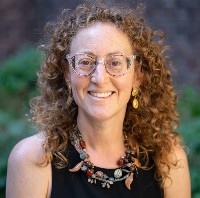 Innovative Researcher in Action
Innovative Researcher in Action
Interview with Associate Professor Corey Shdaimah, LLM, PhD
Researcher and Policy Expert Advocating for Social Change at the Intersection of Law and Social Work
by Chinonye Donna Egbulem
Corey Shdaimah is an Associate Professor at the University of Maryland School of Social Work. She is also the Academic Coordinator for the MSW/JD Dual Degree Program. In this month's research spotlight, Dr. Shdaimah describes how the use of qualitative methods and legislative advocacy inform her ongoing research on child care policy, dependency court reforms, and criminal justice responses to sex work.
On her journey as a faculty member at University of Maryland School of Social Work:
January 2017 will mark Dr. Shdaimah’s 11-year anniversary as a faculty member in the School of Social Work. While practicing as an attorney in Israel for 4 years, she developed a strong interest in the way that professional relationships with clients are shaped by the mutual expectations and understandings of the role of the client in each relationship. Soon thereafter, she returned to the United States to pursue a year-long Master of Laws (LL.M.) degree, and subsequently a Ph.D. at Bryn Mawr’s Graduate School of Social Work and Social Research. What she appreciated the most about this new discipline was that “It’s okay to be passionate about what you were studying and that it didn’t make you a bad scholar to care about the topic” and that it was “very interdisciplinary – both methodically and theoretically”. Fast forward to today, she currently has three main research and scholarly areas: alternative criminal justice responses to street-based sex work, childcare policy, and child welfare court reform.
On how her research informs the work-life discussion:
With respect to all three of her main areas of research, Dr. Shdaimah reports that there is a large group of people who are all in disagreement with the current state of affairs. This disagreement is not only among those who are impacted by such policy, but also people who are carrying out the policies. The feedback she receives from clients tends to be similar to feedback from judges and prosecutors. The bottom line is that both parties feel as if policymakers don’t pay attention to street-level bureaucrats, but these are the people who are charged with carrying out policies, all too often with insufficient resources and conflicting mandates. This is applicable to all areas of work-life research and policy. In regard to childcare policy, Dr. Shdaimah’s wish is to “see a policy response where there is more government support to provide what parents want from childcare providers”, such that caregivers wouldn’t have to bear the brunt of high-costs.
On her current methodological approaches:
Dr. Shdaimah began using qualitative methods as a doctoral student. From personal experience, she states, “When you’re interested in relationships and processes, qualitative research is the most appropriate method”. She was interested in concepts and ideas that could not be operationalized in a rich enough way using quantitative research. Given the fact that most of her research was exploratory, she appreciated the fact that qualitative research focused on the experience of the research participants. This method allowed the respondents to shape the conversation, and to change her research questions to focus more on things that clients were telling her that she didn’t expect to know.
On how her research informs public policy decisions related to work and family management:
Dr. Shdaimah’s childcare policy research started as a personal project. When she had children, she struggled to find appropriate and affordable care for her children. She found herself in the middle of a policy mismatch affecting her own life. She had a personal stake in childcare policy; she recognized that this was a policy area that crossed many different demographic groups. From working directly with union representatives and advocates in New York State to submitting op-eds to writing online publications designed for lay audiences, Dr. Shdaimah makes a concerted effort to disseminate information gathered from her research to the general public, so that she and her colleagues can participate in this ongoing dialogue and conduct research which is both informed by, and also adds value, to these conversations. Furthermore, she works as a consultant with the Maryland Judiciary to strengthen university/agency research partnerships to enhance child welfare outcomes; she serves in a pro-bono capacity on a number of their committees. By working very closely with State agencies to collaborate and facilitate change in the court and child welfare system, Dr. Shdaimah hopes that her work can directly impact and improve the lives of the individuals and families on which her research is based.
This past September, WHYY’s Mary Cummings-Jordan interviewed Dr. Corey Shdaimah and her colleague Dr. Linda Houser. They discussed the presidential candidates’ plans and the current family leave and child care policies in the United States. If you haven’t already, be sure to listen to the interview here.
